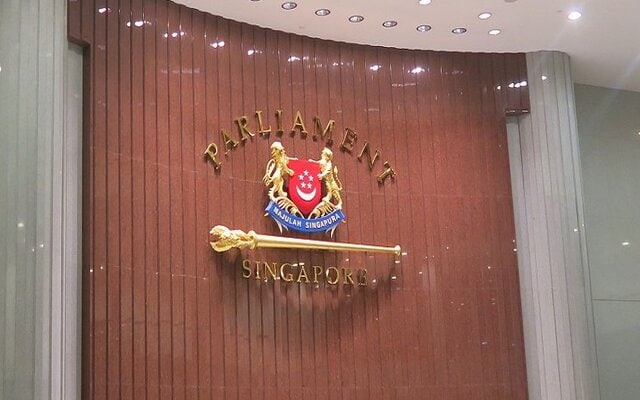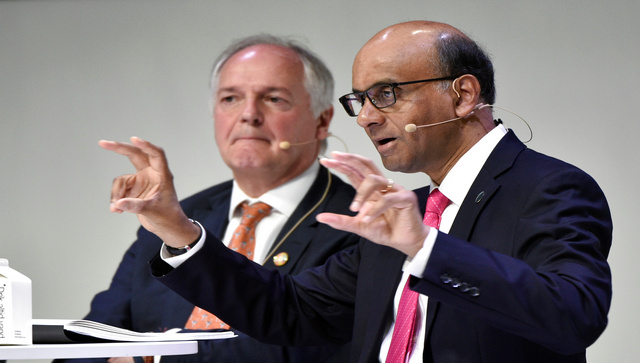An Indian-origin man was elected president of Singapore. In the city-state’s first competitive election for the mostly ceremonial role in more than a decade, Tharman Shanmugaratnam was declared officially elected president on Friday, according to official results. After receiving 70.4 per cent of the total votes cast, the Elections Department declared the economist as the winner over two opponents. He succeeds incumbent Halimah Yacob, who won a six-year term in 2017 with no opposition. “I believe that it’s a vote of confidence in Singapore. It’s a vote of optimism for a future in which we can progress together,” Shanmugaratnam said in a speech before the results were announced. But who is Shanmugaratnam, who previously served as Singapore’s deputy prime minister? Let’s take a closer look: Early years and education According to Daily O, Shanmugaratnam was born in Singapore on 25 February, 1957. Shanmugaratnam’s grandparents were Indian immigrants. He traces his roots to Tamil Nadu. Shanmugaratnam’s father, professor Kanagaratnam Shanmugaratnam, made major contributions to cancer research and healthcare, according to The Independent Singapore.
Known as Singapore’s “Father of Pathology”, Kanagaratnam passed away in 2018 at age 97.
Shanmugaratnam is one of three children. According to the website Prestige Online, Shanmugaratnam while in school coauthored a poetry book But We Have No Legends with his classmates. After completing his schooling in Singapore, Shanmugaratnam studied at the London School of Economics and University of Cambridge. He later obtained a Master’s in Public Administration at Harvard University’s Kennedy School of Government, where he was named a Lucius N Littauer Fellow for outstanding performance. Shanmugaratnam is married to Jane Yumiko Ittogi – a former lawyer who now does social work. The couple has been married over three decades and have four children – a daughter and three sons. Career and politics Shanmugaratnam spent most of his professional career at the Monetary Authority of Singapore (MAS) – the island state’s central bank and financial regulator – where he served as chairman from 2011. He got into a legal tangle in the 1990s when he was fined for failing to protect the secrecy of official information after economic data was published in a newspaper ahead of its release. Shanmugaratnam had pleaded not guilty. He joined politics in 2001. Shanmugaratnam was first elected Member of Parliament in 2001, in Jurong Group Representation Constituencies (Jurong GRC) which allows candidates from the minorities to join a group led by members from the city state’s predominantly Chinese-origin population. He has been re-elected to four times since.
He previously served as Deputy Prime Minister for eight years.
He was also finance minister and education Minister. In 2015, when he was serving as deputy prime minister and finance minister, Shanmugaratnam’s name kept cropping up as a possible prime ministerial candidate. He was the Coordinating Minister for Social Policies and also advised the Prime Minister on economic policies. He has served as the Minister for Education and Finance and was the Deputy Prime Minister from 2011 to 2019. Shanmugaratnam had been Senior Minister of Singapore since May 2019. [caption id=“attachment_12881962” align=“alignnone” width=“640”] Singapore Parliament. parliament.gov.sg[/caption] Well known on international circuits and a darling of international investors, he has also held prominent posts at international organisations including the International Monetary Fund where he was appointed chairman of the policy steering committee in 2011, as well as the World Economic Forum and the United Nations. Shanmugaratnam is chair of the G20 Eminent Persons Group on Global Financial Governance. He was also the first Asian chairman of the International Monetary and Financial Committee. Shanmugaratnam chairs the Board of Trustees of the Singapore Indian Development Association (SINDA), which seeks to uplift educational performance and social resilience in the Indian Singaporean community. ‘Intend to be president for new era’ “I stepped into this race because I feel very strongly in the need to evolve Singapore’s culture, some of our norms and the way we go about working with each other so that we remain a shining spot in the world,” he said at a press conference. He said he intended to be “a President for a new era” as he officially launched his campaign for the office. Accompanied by his wife Jane, Shanmugaratnam outlined challenges facing Singapore both globally and domestically and emphasised that the nation’s real challenge was to avoid becoming a divided society. “If I’m fortunate enough to be elected as President, I pledge to bring my full experience and capabilities on the ground nationally and internationally, to serve as your President for this new and more challenging era,” Channel News Asia quoted him as saying. The senior politician said his 22 years in politics had given him ample experience in unifying people, an important role for the president. “When we talk about being a unifying figure, I do not say this rhetorically or just as an aspiration but I speak from a real track record,” he said. “That includes the track record of respecting different views, including different political leanings and constantly trying to find common ground,” he said. Shanmugaratnam said he would also fulfil other responsibilities of the presidency such as safeguarding the reserves, citing his experience in government and politics over the years. He said he would bring a “more basic orientation” of integrity and independence of mind, which he has been known for. “I don’t have to change my colours like a chameleon. I’m the same person with the same integrity and same independence of mind, and that remains critical for the role of the president,” he said. There were three prospective candidates who had publicly announced their intention to contest the polls. The other two prospective candidates who announced their intention to contest the election were businessman George Goh and investment manager Ng Kok Song. Under requirements laid out in Singapore’s Constitution, public sector presidential candidates must have held office for at least three years as a minister, chief justice, attorney-general or other high-level posts. Private sector candidates must have served for at least three years as chief executives of a company with an average of Singapore dollars 500 million in shareholders’ equity. Singapore held its first presidential election since 2011 after President Halimah announced on 29 May that she would not seek a second term. She is the country’s eighth and first female president. Her six-year term ends on 13 September. The 2017 presidential poll was a reserved election, in which only members of the Malay community were allowed to contest. Halimah was named president then as there were no other candidates. As per _CNBC, t_he post of president is largely a symbolic and ceremonial one. The president has limited executive power over the Singapore government and controls the national reserves. With inputs from agencies
Singapore Parliament. parliament.gov.sg[/caption] Well known on international circuits and a darling of international investors, he has also held prominent posts at international organisations including the International Monetary Fund where he was appointed chairman of the policy steering committee in 2011, as well as the World Economic Forum and the United Nations. Shanmugaratnam is chair of the G20 Eminent Persons Group on Global Financial Governance. He was also the first Asian chairman of the International Monetary and Financial Committee. Shanmugaratnam chairs the Board of Trustees of the Singapore Indian Development Association (SINDA), which seeks to uplift educational performance and social resilience in the Indian Singaporean community. ‘Intend to be president for new era’ “I stepped into this race because I feel very strongly in the need to evolve Singapore’s culture, some of our norms and the way we go about working with each other so that we remain a shining spot in the world,” he said at a press conference. He said he intended to be “a President for a new era” as he officially launched his campaign for the office. Accompanied by his wife Jane, Shanmugaratnam outlined challenges facing Singapore both globally and domestically and emphasised that the nation’s real challenge was to avoid becoming a divided society. “If I’m fortunate enough to be elected as President, I pledge to bring my full experience and capabilities on the ground nationally and internationally, to serve as your President for this new and more challenging era,” Channel News Asia quoted him as saying. The senior politician said his 22 years in politics had given him ample experience in unifying people, an important role for the president. “When we talk about being a unifying figure, I do not say this rhetorically or just as an aspiration but I speak from a real track record,” he said. “That includes the track record of respecting different views, including different political leanings and constantly trying to find common ground,” he said. Shanmugaratnam said he would also fulfil other responsibilities of the presidency such as safeguarding the reserves, citing his experience in government and politics over the years. He said he would bring a “more basic orientation” of integrity and independence of mind, which he has been known for. “I don’t have to change my colours like a chameleon. I’m the same person with the same integrity and same independence of mind, and that remains critical for the role of the president,” he said. There were three prospective candidates who had publicly announced their intention to contest the polls. The other two prospective candidates who announced their intention to contest the election were businessman George Goh and investment manager Ng Kok Song. Under requirements laid out in Singapore’s Constitution, public sector presidential candidates must have held office for at least three years as a minister, chief justice, attorney-general or other high-level posts. Private sector candidates must have served for at least three years as chief executives of a company with an average of Singapore dollars 500 million in shareholders’ equity. Singapore held its first presidential election since 2011 after President Halimah announced on 29 May that she would not seek a second term. She is the country’s eighth and first female president. Her six-year term ends on 13 September. The 2017 presidential poll was a reserved election, in which only members of the Malay community were allowed to contest. Halimah was named president then as there were no other candidates. As per _CNBC, t_he post of president is largely a symbolic and ceremonial one. The president has limited executive power over the Singapore government and controls the national reserves. With inputs from agencies
)